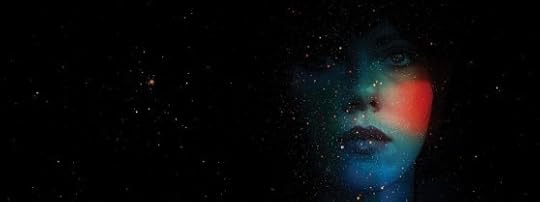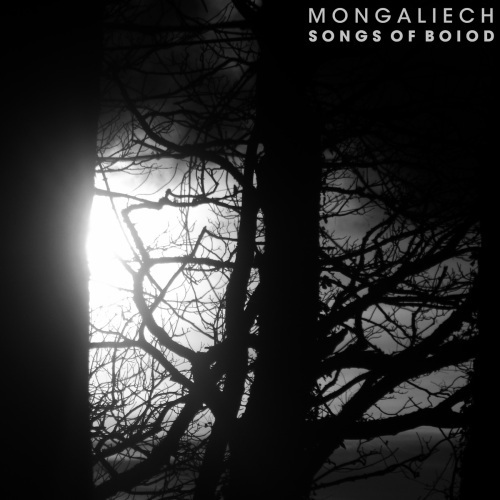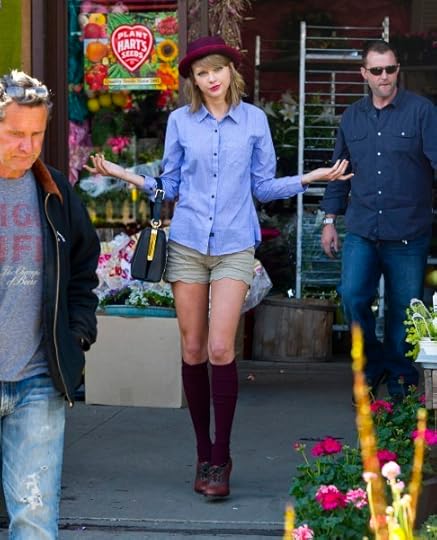Teodor Reljic's Blog, page 20
July 1, 2014
‘Do you really want to be normal?’ | Penny Dreadful
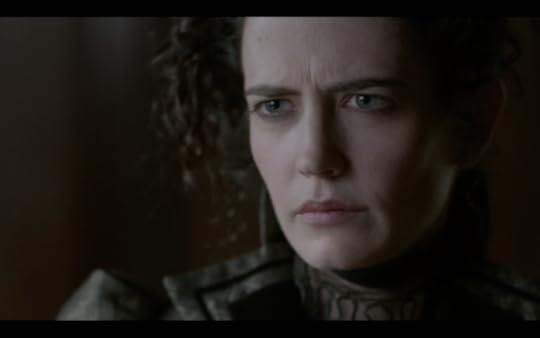
Vanessa Ives (Eva Green) is asked a tough question in the final moments of the first season of Showtime’s Penny Dreadful
Spoilers for the first season of Penny Dreadful ahead
“Do you really want to be normal?”
That question, delivered by a seemingly benign Welsh priest (though given the particular show’s propensity for sneaky evil presences, one shouldn’t be too sure) concludes the final episode of the first season of Showtime’s Penny Dreadful, fading to black before the show’s erstwhile protagonist, Vanessa Ives (Eva Green) can respond.
It’s an apt question to ask – even an apt question to end a season on – considering we’re dealing with a show about characters who are either grotesque, extraordinary or a mix of both. But it’s also pertinent to the show’s structure itself. Like the critically lauded but structurally uneven True Detective before it (also a moody slow-burner entrenched in the history of horror fiction, albeit the two shows picking two separate – Transatlantic, even – branches of the tradition), Penny Dreadful had eight episodes in its first season.
Apart from being somewhat atypical in the current trend of ongoing ‘prestige’ television dramas, whose seasons generally take in at least 10 and up to 13 or 14 episodes, Penny Dreadful – perhaps contrary to its title and the associated cultural pedigree that that implies – opted to unspool its story in slow drops, instead of at a frenetic pace, with a twist and/or “shocking” character revelation at every corner.
In addition to this, the show also kept its cards to its chest – and still has quite a few, it must be said, even after the season one finale – so that while it was hoped that the viewers would remain intrigued by the mystery, it was never quite certain which parts of the story had the most urgent implications for our characters. And to make things even harder for itself, the show dedicated two whole episodes – precious time, for such a considerably brief season – on flashbacks.
This begs the question: is Penny Dreadful just slow, or have we been ‘spoiled’ by a certain degree of acceleration in the way TV series tend to be delivered?
*
Indeed, Penny Dreadful has nothing like the immediate (and sustained) hook of Breaking Bad, which works because it’s striking, simple and also workable over the long term: Walter White’s cancer is a looming portent of doom, while his gradual transformation into a drug baron can be enjoyed episode-to-episode (or perhaps more accurately, it can be charted from season to season) because it’s precisely that: a transformation, a journey, an element of the story that yields new developments by its very nature; and in this case, it’s a particularly seductive element as it promises to transform our protagonist from hero to villain. 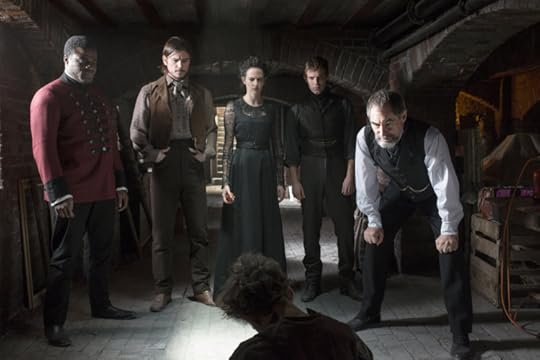 Neither can Penny Dreadful boast of the huge cast of characters and intersecting story-lines one finds in Game of Thrones which, unlike Penny Dreadful, can satisfy a large and varied swathe of viewers with each episode, as George RR Martin’s vast, medieval-fantasy-tinged, world can flicker from one sub-plot to another in the blink of an eye, with each sub-plot practically catering to its own mini-genre (political thriller, domestic drama, picaresque journey, fantasy actioner… even horror of the ‘torture porn’ variety).
Neither can Penny Dreadful boast of the huge cast of characters and intersecting story-lines one finds in Game of Thrones which, unlike Penny Dreadful, can satisfy a large and varied swathe of viewers with each episode, as George RR Martin’s vast, medieval-fantasy-tinged, world can flicker from one sub-plot to another in the blink of an eye, with each sub-plot practically catering to its own mini-genre (political thriller, domestic drama, picaresque journey, fantasy actioner… even horror of the ‘torture porn’ variety).
Penny Dreadful – perhaps by dint of its title alone – can’t even claim to be ‘above’ genre television, necessarily. It can’t afford to luxuriate in the longueurs of a Mad Men without consequence, because its premise, and the cultural milieu it pastiches, demands a certain amount of genre-familiar action: an expectation corroborated by the memory of the literary characters it has adopted (who are, at the very least, a century old, which increases the expectation we have of them substantially).
*
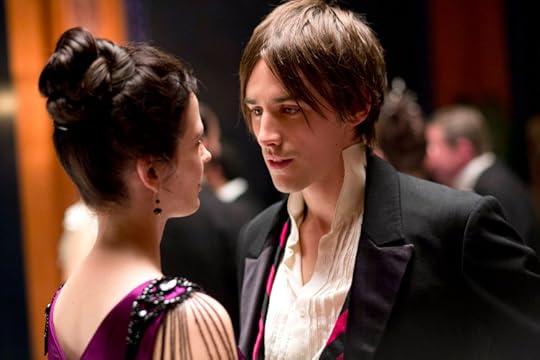
Vanessa Ives (Eva Green) and Dorian Grey (Reeve Carney)
Am I suggesting that Penny Dreadful is faultless, or that any faults it may have should be forgiven because we appear to have been ‘spoilt’ by accelerated storytelling (even in long-haul drama) in this day and age? No.
Come the conclusion of season one, a couple of things about the show still rankle me slightly, namely:
1) The season’s primary plot engine: Sir Malcolm Murray (Timothy Dalton) and Vanessa’s quest to retrieve Mina Murray (Olivia Llewellyn). It just feels a little thin. Though there’s enough simmering interpersonal drama between Malcolm and Vanessa to spare (as we learn about half-way through the season), and though of course the supporting characters also do their part in filling up the episodes leading to the climax, the sweep of it just doesn’t feel epic enough to justify an entire season. (I wonder if a plot reshuffle would have worked better… if, say, Mina is actually retrieved earlier on – even as early as the third or fourth episode – but it turned out that she is still gripped by whatever evil she appears to be possessed by. The rest of the season would then progress much in the same way, but it would also be free of what is essentially a threadbare ‘final destination’. As it stands, it feels as though the story will only get going come season; and
2) The fact that Dorian Grey (Reeve Carney) appears to have been thrown into the fray to elicit sexual tension and titillation and little else. His character arc will doubtlessly pick up come season two (we weren’t offered a glimpse of his infamous portrait after all), but it was sloppy of the writers not to leave any breadcrumbs for us at all. Come the final episode, he’s a cipher – and not a tantalizing one, at that.
*
But you’ll be hard-pressed to deny that Penny Dreadful is a sumptuous, atmospheric and impeccably photographed show, despite all its faults. This isn’t just cosmetic praise: its production value works towards creating its atmosphere of gloomy dread and, ultimately, menace. And I think this is far more worthwhile a dramatic pursuit than endeavoring to create a ‘monster-of-the-week’ type show, which this easily could have become, and which even I suspected it may have been (and I probably wouldn’t have minded one bit if that were the case, I must admit).
Like Hannibal – a show I love and admire even more than Penny Dreadful – it shoots everything in a gloomy chiaroscuro, reinforcing the sense that, if there’s a light at the end of the tunnel for these characters, they’re going to have to work through plenty of gloom to get to it. But more than just being a trick of cinematography and production design, this prolonged sense of foreboding helps the story.
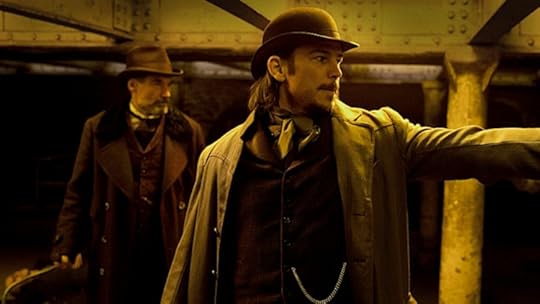
Ethan Chandler (Josh Hartnett) and Malcolm Murray (Timothy Dalton)
Because it’s a story about how evil is incredibly hard to beat. Though we were promised Dracula, and though some kind of vampire mythos is most certainly at play here, the suggestion is that the old Count (or some version of him), is being helped, or is subservient to, an ancient Egyptian deity who appears to be channeling powers we’d normally associate with Satan (at least in pop culture lore).
Eva Green’s Vanessa is of course the fulcrum of all this: because this demonic presence appears to have taken a liking to her, she’s also made to serve as bait for Mina – or, at least, as a tracking device. In a show as restrained as this – restrained, at least, within its genre – Vanessa’s moments of demonic possession were the key set pieces… and it’s commendable that the ‘wow’ factor of the show depended not on shocking key character deaths (Red Viper, anyone?) but rather, on an actress’ talents, necessarily OTT as those particular moments were. 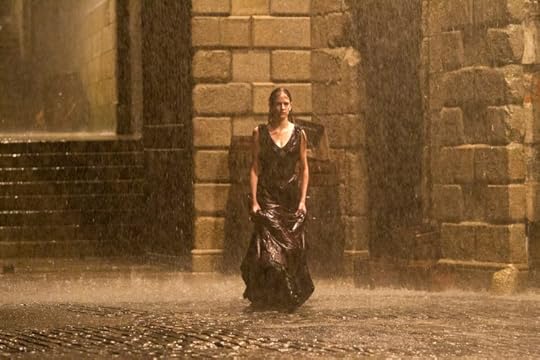 The adage ‘force of nature’ is one of those hateful phrases that are tossed around too easily, but Green certainly gives the show her all: she can switch from beautiful to horrific, from formidable to crushed, in the blink of an eye.
The adage ‘force of nature’ is one of those hateful phrases that are tossed around too easily, but Green certainly gives the show her all: she can switch from beautiful to horrific, from formidable to crushed, in the blink of an eye.
Her effective martyrdom, powerfully rendered by Green, points to one thing above all: there is no talisman or magic charm, no arcane incantation that will drive this malevolent presence out for good (though our boy Ethan (Josh Hartnett) surprised everyone with his spot of impromptu exorcism, which saved Vanessa’s life in the season’s penultimate episode).
*
The chosen tone of John Logan’s show – which has thankfully been confirmed for a second season – makes perfect sense for the kind of property (the word is crucial here) that it is.
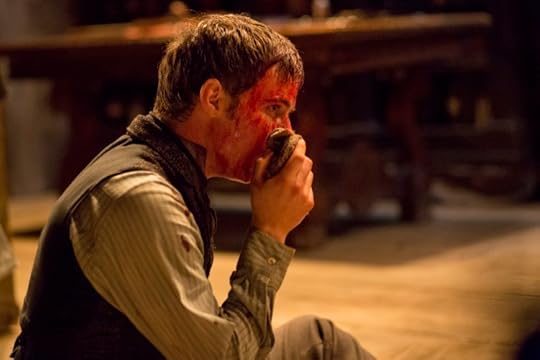
Victor Frankenstein (Harry Treadaway)
Save for Vanessa, we know a lot of these characters from their source material (that includes Malcolm Murray, who is H. Rider Haggard’s Allan Quartermain in all but name), and the show can’t play too closely to that. Instead of exploiting its Gothic and supernatural pedigree for effects-laden gimmicks and sensationalist shocks, it’s playing the long game, and keeping us guessing.
Or would you rather it were a “normal” show, after all?
*
Questions:
1) Do you think that the eight-episode arc is proving to be a real challenge for TV writers?
2) Genre historians! Would you say that Penny Dreadful follows an old-school model of storytelling? Did the original penny dreadfuls have a similar structure? Haven’t had a chance to research this myself, so I’m really curious about this.


June 29, 2014
Rapping

Dizzee Rascal performs at the Isle of MTV 2014 concert at the Granaries, Floriana, Malta. Photo by Ray Attard/Mediatoday
“I’m attracted to the idea that trickster narratives appear where mythic thought seeks to mediate oppositions. Just as Raven eating carrion stands between herbivore and carnivore (or, in my own earlier version, just as Raven stealing bait stands between predator and prey), so there is a category of mythic narrative, a category of art, that occupies the field between polarities and by that articulates them, simultaneously marking and bridging their differences. It is the tale in which Coyote tries to retrieve his wife from the land of the dead but creates death as we know it, Coyote does go to the underworld and so overcomes the barrier between life and death, but at the same time his impulses overcome him and the barrier remains.” – Lewis Hyde
*
Covering the annual Isle of MTV festival is one of the great, regular Calvaries of my existence as a journalist. Or rather, the pre-show press conference itself: you couldn’t pay me enough to attend the free-of-charge crush of sweaty (largely foreign) teenage bodies – the Granaries in Floriana rearing to crack under their weight – and all the while, the otherwise proud St Publius Church gazes on.
Being filed into the pool area of a five-star hotel: the international press primped, young and eager, at the ready with tabloid-friendly questions to fire off; the local media hot, bothered and blase, tired of hearing just how “beautiful, historical” Malta is, how “friendly” its locals are, and, apparently, how awesome the fish is.
But East London rapper Dizzee Rascal was something of a refreshing presence in this year’s otherwise stale and repetitive churn of pre-prepared, mealy-mouthed sound-bites.
Asked (by the chipper, elfin-faced and Irish-inflected MTV VJ Laura Whitmore) about what he thinks of the Isle of MTV image as a production, he replied: “Well MTV’s got the money, innit?”
Asked (just like his Isle of MTV colleagues were) about how he’ll handle the oppressive heat on stage, he replied: “I mean it’s only a 20-minute set, really, we’ll be okay.”
Asked (by an equally chipper local radio journalist) whether performing at Glastonbury was the highlight of his career so far, he replied: “I don’t know… I actually think the proudest moment of my career so far is being able to buy my mum a house.”
Cue applause.
*


June 27, 2014
The Butler on the Heath | Joseph Marcell
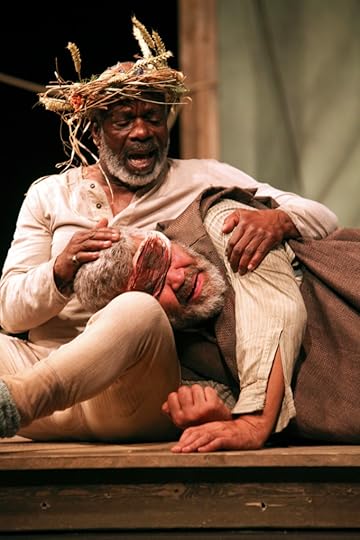
Joseph Marcell as King Lear and Rawiri Paratene as Gloucester. Photo by Ellie Kurrtz
So I got to interview Joseph Marcell, aka Geoffrey from The Fresh Prince of Bel Air, for the paper a couple of week’s ago.
The phone interview was arranged in light of his forthcoming visit to Malta, where he will be playing the title role in The Globe Theatre’s touring production of King Lear.
I will admit to feeling star-struck by the opportunity. I will also admit to succumbing to a slight bout of panic when the phone number I was instructed to call appeared to be non-existent. But once that logistical hiccup was ironed out, Mr Marcell instantly put my nerves at ease, doing good to the memory of Geoffrey with his effortlessly cordial demeanour.
*
“From where I’m standing… I think what people responded to [in Geoffrey] was the fact that he’s an employee who doesn’t hesitate to criticise his employers. He’s not a bore: he pushes the boundaries and risks things all the time.”
“Upon my return to the UK, I didn’t have white lilies in my dressing room, a personal assistant and Voss water from Norway – I had to deal with that kind of stuff (laughs)! But seriously, it was difficult in some ways because the Hollywood thing is that you have people who do things for you – in the theatre, on the other hand, you do things for yourself.”
“To be honest, that is the sort of thing you think when you’re in your 20s – that King Lear is the role you ought to be playing later on in your career. But then when you get there you realise there’s so much more to it than that.”
Click here for the full interview


June 25, 2014
Monstering
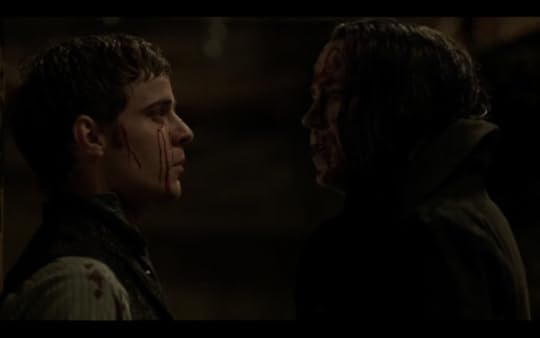
Victor Frankenstein (Harry Treadaway) and his Creature (Rory Kinnear) in Showtime’s Penny Dreadful (2014)
“By revealing that difference is arbitrary and potentially free-floating, mutable rather than essential, the monster threatens to destroy not just individual members of a society, but the very cultural apparatus through which individuality is constituted and allowed. Because it is a body across which difference has been repeatedly written, the monster (like Frankenstein’s creature, that combination of odd somatic pieces stitched together from a community of cadavers) seeks out its author to demand its raison d’être – and to bear witness to the fact that it could have been constructed Otherwise” – Jeffrey Jerome Cohen
*


June 23, 2014
Permission to exhale | Under the Skin
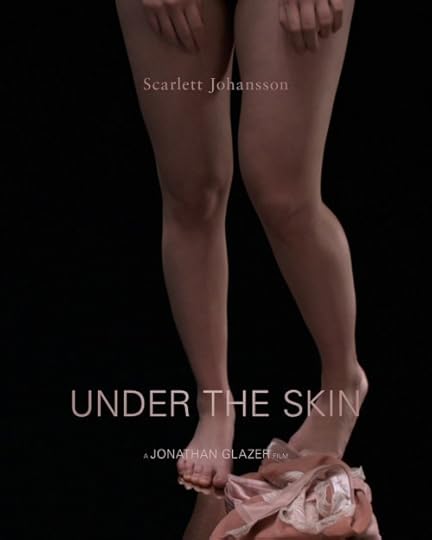 If Lars von Trier’s Nymphomaniac implores us to “forget about love“, then Jonathan Glazer’s acid-sharp body-snatcher thriller Under the Skin seems to be asking us to forget about sex too, at least “as we know it”, both in real life and movie convention.
If Lars von Trier’s Nymphomaniac implores us to “forget about love“, then Jonathan Glazer’s acid-sharp body-snatcher thriller Under the Skin seems to be asking us to forget about sex too, at least “as we know it”, both in real life and movie convention.
Adapting Michael Faber’s novel of the same name, Glazer casts Scarlett Johansson as a woman on a mission to seduce and kill as many male Glaswegians as she can manage, working on the orders of what appears to be an unsavory research team of some kind (whether they’re aliens or just morally bereft scientists is never really spelled out in the film itself).
Beyond that, however, the audience is as much in the dark as Scarlett’s victims (the protagonist is never named), and this is the key to the film’s appeal: a journey through complete emotional disconnect which seems to suggest that something may just be developing around its edges.
Species it certainly ain’t, but is it just an art house variant of the cheap slasher film?
Throughout the film’s first half – which I would perhaps somewhat paradoxically argue is its strongest – one is tempted to answer “yes” to that question. Though devoid of cheap thrills and ultimately meandering – and therefore non-sensational – in how it presents the predator-prey encounters, Glazer knows how to calibrate our response to imminent menace, and his finely-tuned aesthetic sense is exploited for terror wonderfully here.
Playing into – rather than playing up – Johansson’s status as a Hollywood sex icon, Glazer derives both suspense and humour from the central conceit (ScarJo cruising for men).
A key scene, which takes place on a beach, will probably be among the most-discussed segments of the film. Actually not spurned by an ostensibly sexual encounter, it’s a depiction of complete callousness that cuts to the bone, with our (alien or otherwise) protagonists looking on impassively as tragedy unfolds right in front of them.
The scene is also another example of Glazer’s calculated vision. It’s a mathematical arrangement of unpleasant details: crashing waves over a dangerously rocky beach, a thwarted rescue, a screaming child left behind. Genuinely gripping, or just well-curated contrivance? It really is up to you to decide, and I think that a film which exists on such finely-tuned polarities is worth exploring.
That said, its second half is substantially weaker. A plot development is allowed, which – perhaps necessarily, perhaps not – deflates some of the tension and attempts to wrestle with themes that deserve a full film in their own right, not the tail-end of one.
But that an aura of mystery is maintained throughout can certainly be appreciated, and in developing the idiosyncratic atmosphere of the film, Glazer owes much to composer Mica Levi, whose score is by turns minimal and overwhelming (the signature tune bursts in almost as if it’s been snuck out of an Italian ‘giallo’).
But it’s Johansson, of course, who turns out to be his bravest and most consistently compelling collaborator. The Guardian’s Leo Robson used “prick her and she doesn’t bleed” to describe her performance, and I won’t bother trying for a more economical or apt descriptor. This isn’t a wooden performance masquerading as ‘laconic’ or ‘depressed’; this really is a consistent, stark display of non-being.
Though Faber’s (and now Glazer’s) story is at its core an old one – think Frankenstein, better still, think Pinocchio – Glazer is to be commended for going full-bore against that most comfortable of narrative short-hands: making characters and situations ‘relatable’.
Chilly and immersive in a way that can only be fully experienced on the big screen, Under the Skin is a sinister blank canvas. What you see most definitely not what you get. Or is it?
*
Under the Skin will be showing at St James Cavalier, Valletta on 28 June and 3 July


June 10, 2014
Got the Itch | Under the Skin
Scarlett Johansson is dropped into Glasgow dressed as any other woman and ready to be picked up by the nearest gentlemen. Jonathan Glazer, the director, follows her with a string of hidden cameras, and turns the street into a theatre. A fiction about desire, the object of wonder, and that pale extraordinary woman with red lips who just happens to strike a fancy on the passer by.
*
Good news: my adoptive country will be getting to see the Scarlett Johansson-starring, Jonathan Glazer-directed Under the Skin from this Friday onwards, by which time it would hopefully have not hit the pirate networks and will entice a generous-enough audience to St James Cavalier in Valletta, where it will be showing for a total of six screenings from mid-June to early July.
*
Glazer’s film – based on the book of the same name by Michael Faber, whose prose has previously been adapted into BBC’s rather good ‘R-rated Dickens’ mini-series The Crimson Petal and the White (2011) – has intrigued me for quite some time, not least because of its seemingly arch approach to genre: it seems to have elements of both sci-fi and horror, but the overall arc of it appears to suggest something ultimately undefinable and definitely eerie.
It also appears as though the team behind the film – and this includes the star herself – appear to be keen to strip the glamour off Scarlett Johansson’s persona.
This interests me because a) it appears to play against the way stars are constructed these days, which is only a metonym for how we consume and internalize them; and b) it’s a reminder that Johansson wasn’t always a sex goddess (remember Ghost World?) and that her on-screen transformation into one was, I think, signalled quite clearly with that opening shot of Lost in Translation. Does it mean it can be unmade just as easily now?
By making her play an alien who preys on men, will Jonathan Glazer succeed in letting her career and aesthetic direction develop into something more substantial?
*
Either way, Glazer will always have the benefit of being a curio, of being someone who operates from at least one remove from the standard Hollywood system; even, perhaps, beyond the indie film festival carousel.
His music video CV is thicker than his feature-filmography, which suggests that he can’t be bothered with the grind of narrative cinema and will only approach a project if it really interests him through and through.
There’s always risk involved here (music video directors-turned-feature film directors run the gamut from dazzling to dire), but this makes them an interesting phenomenon either way.
Personally I found his debut Sexy Beast (2004) to be a style-over-substance kind of experience. Save Ben Kingsley’s blistering turn as a deranged gangster who pays (an ultimately unwelcome) visit to his former colleagues’ idyllic island getaway, the film could easily have been directed by Guy Ritchie – the Brit-gangster tropes are very much in place (with iconic tough guy Ray Winstone leading the show, they can’t help but be) and the narrative is thin.
Birth (2004), on the other hand, is a different kettle of fish entirely. The premise grabs you – Nicole Kidman’s husband comes back to life in the body of a 10-year-old boy just as she’s about to get remarried.
But instead of being blunt or exploitative, it’s a delicate experience; the music and the affluent and snow-capped New York surroundings making the whole thing feel like a fairy tale. And here fairy tale does not mean Disney cartoon with a happy ending tacked on; it means the simple but ominous build-up of otherworldly doom that suffuses the story as each element of it clicks inevitably into place.
Different as they are, what both Sexy Beast and Birth share is the theme of an intruder disrupting the characters’ comfort. You could say that Glazer enjoys existing – or, at least, of telling stories – in this zone of discomfort.
So far we’ve had a Mad Trickster (Sexy Beast), a Ghost (Birth) and now we have an Alien (Under the Skin).
The latter promises to be the most foreign, the most unsettling. Let’s hope it lives up to its title. Because we’re all masochists at heart, aren’t we?


May 20, 2014
LISTEN | Fastidju & Mongaliech
I especially like my music dark and immersive – I find it perfect to write to, for one thing, and my social network has been very generous on that front this particular month of May (hey, it is my birthday month after all), as two friends of mine – one from this here isle, the other from one further up north in Scotland – both unveiled their dark, twisted projects to the world, and I found them both a joy to listen to.
First out of the gate is Fastidju, the brainchild of Nigel Baldacchino who, together with a veritable ‘super-band’ of local talent, has released a double-CD album of haunting, burrowing (and bi-lingual) sounds. It all comes gorgeously packaged too. Check out a track below, and click here to go to the band’s Facebook page, where you’ll find info about how to acquire a copy of the album.
Next is MONGALIECH – a two-man-band release brought to my attention by horror writer Alistair Rennie, one half of this heady initiative. It’s a dramatic soundscape that clearly evokes the duo’s Scottish environs, and will be of particular interest to those who like a bit of horror, in whichever form. Their entire album is available to listen to and download for free from bandcamp. I hope you enjoy it as much as I did.


May 18, 2014
Inspiration | Mad Magus Artist Documentaries
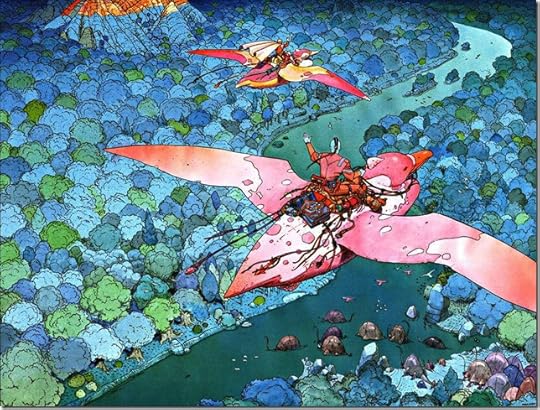
Moebius’ Arzach
Call it glorified procrastination (then again, what isn’t?) or a genuine pursuit of inspiration, but there are few things I love more than watching documentaries about creators I admire.
The release of Jodorowsky’s Dune (which my friend Marco incidentally nattered about on recently over at Schlock Magazine), coupled with the sad passing of HR Giger, made me think of this again, so I thought I’d compile a list of some of my favourites – all of which are thankfully available online.
I know I’ll be returning to this list every now and then for an inspiration top-up. Feel free to suggest any others I may have missed.
In Search of Moebius
The Mindscape of Alan Moore
Lovecraft: Fear of the Unknown
H.R. Giger Revealed
*
Incidentally, did some more nattering of my own, this time into the ears of the protean Maltese lifestyle web-hub, Malta Inside Out.


May 13, 2014
Why I Love NBC’s Hannibal – Part I
Standing with perfect symmetry at the centre of the frame, pop starlet Taylor Swift here embodies divine indifference.
Framed by two other ‘stages of man’ she stands as an aspirational vortex; a totemic reminder of what most of us want but cannot have.
The man to the left, jeans tattered, with the beaten-down expression familiar to so many ‘supporting characters’ in paintings by any number of the old masters, is on his way out: he has tried to scale heights but never managed to reach them, and it is clear that this dawns on him with fresh immediacy every waking day now – now, that he’s realised just how of those days he has left.
To the right is his younger counterpart, his clothes clean-pressed and chosen with sensitivity to colour-coordination, the shades completing a look of sharp impersonality.
And in the middle stands the figure of Taylor Swift: even when disembodied away from the stage, from red carpet events and curated photo shoots, immaculately – because casually – beautiful, her pose strikingly Christ-like but free of any suffering.
Her weary gaze at the paparazzo; she’s so young and already so jaded by the mechanisms of the world – her world, not ours.
*
It’s easy to wrench deities and archetypes out of pop culture representatives, partly because they pitch themselves that way. In some sense they can’t help but do this: see how Taylor Swift, simply by standing in front of a gardening shop, lends an aura of something other than what meets the eye.
The thrill of recognition is of course at the heart of what makes celebrity culture tick: bumping into celebrities, even spotting them on the street, becomes a story worth retelling to friends and family; a memory to be cherished, even in this day and age, where the ubiquitous torrent of images of the same celebrities should be enough to make us entirely jaded.
But the thrill of recognising someone who is supposedly ‘important’ – or at least, special enough for us to separate them above ourselves, and even our peers – remains a key instinct, and it’s not just limited to ‘real’ people (though the layers of simulacra through which celebrities are often transmitted to us do complicate this substantially, I’ll admit).
One such example – of a modern talismanic presence in fiction, I mean – is the figure of Hannibal Lecter. Originally a character in the bestselling Thomas Harris crime-horror trilogy of novels (Red Dragon, Silence of the Lambs and Hannibal), he has of course been elevated to the status of pop culture royalty thanks to his cinematic outing via Anthony Hopkins.
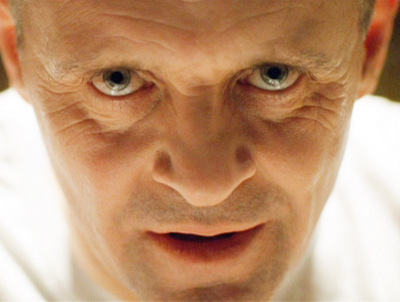
Anthony Hopkins as Hannibal Lecter in Silence of the Lambs (1991)
This was of course a career-defining performance, but it’s worth noting that the constituent elements making up Hannibal Lecter aren’t to be sniffed at. I wish I had a keener, more intuitive grasp of which literary factors, exactly, contributed directly to his creation. Perhaps it’ll serve as a research strand for another day, when I’m in a more industrious mood. Suffice to say that, whoever or whatever may have inspired Harris to breathe life into his archly horrific – and horrifyingly charming – figure, the fact remains that he has comfortably eclipsed them for quite some time, emerging as a trademark fictional character in his own right.
Hannibal Lecter is often citied as one of the great villains in the history of recent narrative. It’s not too hard to see why. He is an intriguing juxtaposition of opposites. Like most outré characters in fiction – the kind of characters whose composition in and of itself is exciting, beyond how they serve the story: think of Dickens – he is fascinating even in isolation. A respected psychiatrist who is also a cannibal. A highly cultivated – ‘cultured’, if you will – self-made man (there is something of an American projection of ‘European’ culture here) who is also in touch – and indulgent of – the most barbaric human impulses.
And now that he has made the jump into television – a medium undergoing its own steady renaissance – his domination has continued apace.
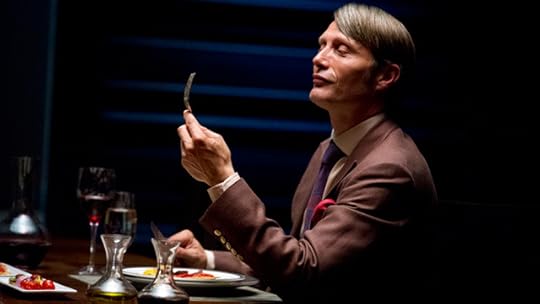
Man of wealth and taste: Mads Mikkelsen as Hannibal Lecter
I am a proud evangelist for Bryan Fuller’s Hannibal, produced and aired by NBC, in which the eminently watchable, razor-sharp-cheekboned Danish actor Mads Mikkelsen takes on the titular role.
Though its first season was a workable enough affair – relying on the basic thrill of recognition of seeing Hannibal Lecter again to spruce up what was essentially an FBI murder-mystery procedural of the Criminal Minds/CSI ilk – come the second season the series reaches full bloom, allowing the ominous relationship between Hannibal and his ‘charge’ – in this case, a younger version of Red Dragon’s Will Graham – to be exploited for its “fucked-up” potential to the fullest.
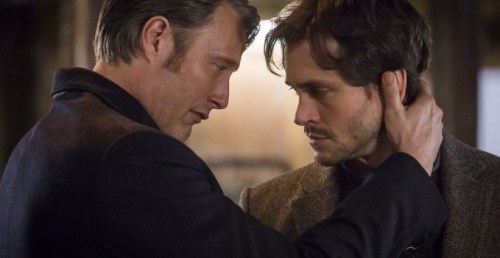
Becoming: Mads Mikkelsen as Hannibal and Hugh Dancy as Will Graham
“Fucked-up” isn’t a cue for cheap titillation here. Being a prequel series to the trilogy we’re used to, the show by necessity has to ‘stretch’ Harris’ central conceit to fill up more story-time. Ordinarily, this would not augur well: stretching anything beyond its organic narrative confines usually results in stories that remain – to broadly apply the term – ‘unnecessary’; a limp extension of its mother-narrative, a decorative but hollow appendage.
No, “fucked-up” here extends the central taboo at the core of Harris’ stories – receiving useful investigative advice from a cannibalistic murderer, “fighting evil with evil” – to a mythic state.
Wrenched free from the three-act structure of novels and films, NBC’s Hannibal exploits the thrill of recognition to drive these characters to their logical narrative conclusion: away from mere innovative kinks, curios of the crime fiction genre, away from the exigencies of the ‘thriller’ plot structure, and further into the realm of the archetype… the realm of myth.
To be continued.


May 2, 2014
Authenticity: Richard Linklater, Woody Allen, Romanticism, Decadence
I’ve stopped giving much credence to birthdays over the past couple of years. Once the rites of passage in life become murkier – i.e., after you’re done with school and have no set ‘stages’ to go through any more – birthdays start to feel truly arbitrary.
But something strange, and just about wonderful is happening this year: right now I truly feel like there’s some kind of culmination of the recent experiences I’ve been through.
Part of all this is, of course, down to finally finishing and publishing the book, and I’m wary of how this feeling of relief mixed with euphoric uplift can be temporary and elusive.
But there’s other factors which have contributed to me feeling an increased sense of peace, and a receding of the persistent self-doubt which comes with – in a big way – from the very same arbitrariness that characterizes most of adult life.
It’s a hard-won sort of peace, though, and one which needs constant vigilance to be maintained.
I suppose the cost of growing up is, ultimately, the realization that bliss can no longer, at any point, come automatically.
*
Increased self-awareness also means an increased sensitivity to what is authentic about yourself – what you should keep and cultivate, and what you should discard because it’s no longer relevant to you: a dead-end road.
Authenticity was always a bit of a thorny subject for me; one the one hand yes, I work for a newspaper – which, at least ostensibly, trades in remaining authentic – while on the other, my primary obsessions are concerned with both the production and consumption of fiction.
A recent ‘catch up’ marathon for three films I’ve been wanting to watch – the ‘Before‘ films by Richard Linklater, starring Julie Delpy and Ethan Hawke (I know, I know) – put this in focus for me once again.
The trio’s breezy style clearly emerges as a result of consummate, carefully cultivated filmmaking, of course, but the way the films worry at concerns so delicate, intimate and – ultimately – relatable puts a number of cinematic attempts at the same themes to shame.
There is both a sensitivity and a kindness – as well as a dramatic dynamism, taking the shape of the best stage play’s effortless back-and-forth banter – to Linklater which made me think, first and foremost (and for whatever reason): Woody Allen is a fraud.
The comparison came to me just as automatically as that: finishing off either the second or the third ‘Before’ film, Woody Allen’s attempts at extrapolating home truths about sexual politics came to mind, and just didn’t ring true.
Where Linklater zooms in on an unfolding relationship between just two people – a thespian duo he clearly trusts – first by charming us with their idyllic romance but then boldly returning to his subject/s years later to shade that relationship, Allen props up his ping-ponging dialogue in the midst of cardboard cut-outs and facile plot developments.
*
My own reaction came as something of a surprise, because in recent years I’ve developed an increased fondness for artifice – a resistance to the ‘organic’ creation of art so vaunted by the Romantics, in favour of what we could, I suppose, at a stretch venture to call a more Decadent approach which places increased value on form and ornamentation.
In retrospect though, I think this may have something to do with the fact that over the past few years, I’ve made a conscious effort to write my own fiction, TO MAKE MORE STUFF, and so the – broadly defined – Romantic idea of ‘waiting for inspiration’ or of dedicating your attention solely to the perfect subject that is closest to your heart was not really helpful.
Focusing on just putting the thing together, on the other hand, helped me to move forward, and so the opposing milieu became more attractive.
*
Now that the novel is done, though, I have to confess that ultimately, its autobiographical elements are what kept me going – or, at least, that engine that whirred in the background, quietly fuelling me ahead as I scrambled to put the whole thing together.
Having a personal stake in something – anything – by its very nature adds urgency to a project, and one of the best things I’ve heard said about Two is that it made some readers – two of them, actually, as far as I know – “give me a hug”, because they recognized the emotional authenticity of the book.
Truth is a slippery thing; I will never understand it, not fully. People are constantly called out on begin ‘phony’ and ‘fake’; even a kind of manufactured authenticity seems to have pervaded our culture (see: Emma Stone, Jennifer Lawrence, and countless other celebrities presented as ‘just one of us’).
But I’ll be happy if I hit upon it, however fleetingly, when “it matters”.
*
Some more coverage for Two:
The Times of Malta – A measured, well-written review I’m quite happy about.
The Malta Independent – An interview by Colin Fitz, also delving into my work as a journalist. Some of the quotes come across as a bit pompous, and I’m fairly certain I was more self-deprecating during the conversation itself. But whatever.
If you – my fine, illustrious readers – insist on doing something for my birthday, might I suggest you pick up a copy of Two, either from “any good” brick-and-mortar store if you’re in Malta and Gozo, or through Merlin’s website if you’re seeing this from abroad? Shipping rates have been reduced to normal prices, thankfully, so you can order away without too much of a burden on your pockets. Ta!



